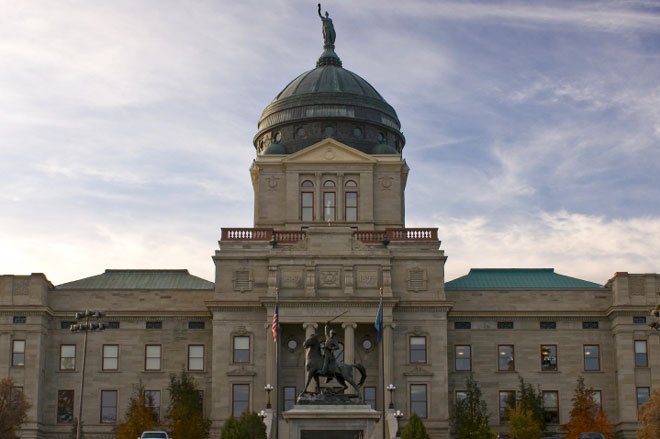News & Updates

Shedding Light on Dark Money
These days, you hear the words “Dark money” tossed around an awful lot when it comes to politics. But what do those words really mean? Why is some political money “dark” and other “light”? If you’ll pardon the pun, today I’d like to shed a little “light” on the situation.
The words “dark money” are often used by people who want to require Americans or Montanans to jump through certain hoops before they’re allowed to contribute to a political campaigns. They claim that their only goal is to have the political donation process be more open and transparent. It’s a nice idea, but in reality what they’re accomplishing is much different. In fact, the disclosure forms that they require have been used in other states to intimidate pro-family donors. In California, one man who donated to Prop 8, the effort to keep marriage between a man and a woman was forced out of his job as a CEO of a company more than eight years later!
In this environment, where political advocates use intimidation and sometimes even death threats, some Montana families want to preserve their right to donate to political organizations without having to give up their right to privacy.
That’s what makes all this talk of “dark money” so misguided. The politicians who set themselves up as opponents of “Dark Money” usually put forward legislation to require everyone who wants to donate to a political organization to fill out forms and give their name, home address, and even where they work. Some bills like that are already making their way through the Montana legislature.
What if you want to donate to an issue campaign to keep marriage between a man and a woman, and someone later on uses that to force you out of your job, as happened in California? Or what if you’re a union school teacher who’s in favor of school choice? We have many supporters of the foundation who are. Do they want their names and addresses published for the union leadership to see? Or, does anyone remember the incident in Connecticut where, while partisans were trying to pass gun control, every single gun permit holder in the state found their location published by the local newspaper?
Montana Families have the right to participate in the political process without fear that some overly-enthusiastic advocate will use their home address to make threats or try to get revenge.
And of course, there’s also the simple idea that people should be free to spend their money how they want. If you want to give $50 to your local legislative candidate, is that really anyone’s business but yours?
Openness and transparency are great ideas when it comes to our elected officials and candidates. But when it comes to revealing the private lives of ordinary citizens, we need to find a better solution. We all want a political process that’s easier for ordinary citizens to understand. We all want a greater role for everyday Montana mothers and fathers, and less influence for powerful special interests. But we can’t give up our rights to privacy and free speech in the process.
At the Legislature, the Montana Family Foundation is actively working to find ways to keep our political process open and accessible to the people, without putting the privacy and safety of Montana families at risk.

Pinehaven Versus the State of Montana
We all remember the story of David and Goliath. Even non-Christians use it as a metaphor to describe the plight of the underdog, or the little guy standing up to the bully. Monday, we’ll compare that metaphor to my grandmother’s saying that you can’t fight city hall, and we’ll see which one wins.
At 8 o’clock, the House Judiciary Committee will hear House Bill 21, a bill to require church affiliated youth treatment programs to come under state control and regulation even if they don’t accept any public dollars. Since there are only a couple of programs in the entire state that qualify, this is truly a David and Goliath moment, and we’ll be there to make sure that Goliath doesn’t win.
The focus of the effort is Pinehaven Christian Children’s ranch in St Ignatius. The ranch began in 1984, and takes troubled kids from across the U.S. In addition to school and the normal treatment programs that one would expect, Pinehaven’s beautiful working ranch setting teaches kids responsibility and a work ethic. They also learn how to appreciate God’s creation under the splendor of the Big Sky.
After an unfortunate series of events including an assault on a student that resulted in a conviction and prison sentence for an employee, and another in which a student ran away in the middle of winter and then froze to death, there were calls to regulate the ranch even though Pinehaven was cleared of wrongdoing. And while the safety of the kids has to be first and foremost, it’s also important to remember that these kids were sent to Pinehaven in the first place because they have some challenges.
The premise behind House Bill 21 is that the state can manage these programs better and more safely than a private entity such as a church. We oppose the bill first because that premise is flawed, but mainly because it’s patently unconstitutional. When the bill was drafted we pulled the records for Pinehills, which is Montana’s state youth correction facility in Miles City, and found that many of the problems that existed at pine haven also existed at Pinehills. The argument can be made that many of these problems are inherent to the nature of the business when you’re dealing with troubled teens. Remember, Pinehaven was cleared of any wrongdoing, but they did make changes to lessen the chances of events like this happening in the future.
The main reason we oppose the bill is that it violates both the establishment clause and the free exercise clause of the U.S. Constitution. If allowed to become law, it would immediately be challenged in court. With regard to the establishment clause, the state is trying to tell Pinehaven what constitutes a true church youth home, saying in effect that if a youth home is owned and operated by a denomination or group of churches, then it’s not quote “churchy” enough, for lack of a better term.
If the church treatment facility is being run in accordance with church doctrine, and the state steps in and says no you have to use our counseling program, then the state runs afoul of the first amendment. We also need to remember the words of the ninth circuit court of appeals in the Canyon Ferry Road Baptist Church Case, where the court said that small incursions on freedom are to be resisted, lest they grow greater. Both of these cases involved the First Amendment, both cases involved attempted incursions by the state of Montana, and Pinehaven, just like Canyon Ferry Road Baptist Church, must resist these incursions lest they grow greater.
It’s one small ranch against the state of Montana, but we know how it tuned out when David fought Goliath.

It’s Déjà vu All Over Again
As the famous Yogi Berra once said “it’s Déjà vu all over again”. Thanks to massive participation from Montana families, I thought we’d sent the transgender athletes proposal straight to the bench. Sadly, the educational establishment wants to send it right back into the game. But I’m not worried. Montana families have got the best defensive line short of this Sunday’s Super Bowl.
Not long ago, the education establishment tried to pass a transgender athletic policy. They wanted to let boys who identify as girls play on girls sports teams. This is a bad idea for several reasons. Federal law requires that women have equal athletic opportunities with men, and that usually means that in sports like basketball or track and field there are boys’ teams and there are girls’ teams. If a girl works for four years to win a starting spot on the volleyball team, that’s a great opportunity. How would it be fair for her to lose that slot to a six-foot-four athlete who has a male body, but identifies as a female? Our young female athletes could lose their spots on sports teams, they could lose college scholarships, there are safety concerns, and there are privacy issues.
Thanks to a tidal wave of opposition from parents and students, we forced the establishment to back down, and our girls were protected. But the educational establishment isn’t ready to give up. The surprising news today is that the transgender athlete policy is back, and all of us need to get back in the fight.
At first, this policy came from the Montana High School Association. Now, it’s back again, this time from the Montana School Boards Association. The Montana High School Association governs high school sports and activities. The Montana School Boards Association, on the other hand, advises school boards for all grades from kindergarten on up.
The Montana School Boards Association sent around a proposed revision to discrimination policies that added sexual orientation and gender identity as protected classes. Originally, they said that local school boards were required to adopt this policy. Later, after the Montana Family Foundation challenged that position, they changed the policy to optional rather than required. Unfortunately, while they say it’s optional, they also throw in lots of vague, threatening language about the dreadful legal consequences that might happen if school boards don’t adopt the policy.
Just as families across Montana were celebrating the return of common sense to school policies regarding boys and girls, we need to get back to work. In towns and cities across our state, local school boards are coming under pressure to adopt this new transgender policy. If it passes at the local level, we could see boys who identify as girls being allowed to use the girls’ locker rooms and restrooms. It happened in Colorado and it can happen in Montana. I urge you to contact your school board as soon as possible and ask what they’re planning to do about the proposed changes to equal education and nondiscrimination policy.
We already killed this ill-conceived plan once. But the problem with politics is that once people get emotionally invested in a bad idea, they keep bringing it back. But, emotionally invested or not, this is still a bad idea. Please call your school board today.

A Perfect Storm at the Capitol
Have you ever wanted to come to the Capitol to see your legislators in action? If so, then this coming Friday would be the perfect day! Several things are happening that will have a profound effect on people across Montana and your input will make a huge difference.
The first is House Bill 282, sponsored by Representative Bryce Bennett of Missoula. A bill to completely rewrite every section of Montana code that deals with marriage. His bill would codify the recent court decision to legalize same-sex marriage. This is a bad idea because it’s extremely premature. The U.S. Supreme Court has agreed to hear the issue of same-sex marriage this term with arguments scheduled for April and a ruling sometime this summer. With the courts divided on the issue, the definition of marriage could still be left in the hands of the states. So, to rewrite all of Montana’s marriage laws before the court even rules is jumping the gun. If you believe that marriage should remain defined as a union between one man and one woman, please come to the Capitol and make your voice heard. The hearing begins at 8:00 am on Friday morning in the House Judiciary Committee.
On a related note – at the same time the Senate Judiciary Committee will hear Senate Bill 179, sponsored by Senator Christine Kaufman of Helena, a bill to create a statewide version of the so-called sexual identity nondiscrimination ordinances now in place in several Montana cities. This is the same law used by homosexual activists in other states to force Christians and members of other faiths to participate in same-sex weddings and to force schools and other facilities to allow men (who think they’re women) to use public restrooms, locker rooms, and shower facilities. The ironic thing is that the complaints under this law would be heard by the Montana Human Rights Commission whose members include people with ties to the ACLU and the Montana Human Rights Network – one of Montana’s largest pro-homosexual organizations. Does anyone really believe that a defendant would get a fair hearing before this board? Come and tell the Legislature that this law in not needed as evidence by the fact that no one has ever been charged under the existing municipal NDO’s, proof positive that Montana’s already a tolerant place to live.
After attending these hearings, you can attend the School Choice Rally at noon on the steps of the Capitol. Montana is only one of eight remaining states with no school choice and it’s time that changed. Nearly 2,000 students drop out of Montana schools each year and school choice would provide them with options that work for them. These options include – public charter schools, scholarships for children with disabilities, and tax credits for those who want to switch to a private school. After the rally, you can attend the House and Senate floor sessions – a great place to see your legislators in action!
So come to the capitol this Friday, January 30th because as I always say – this government is your government and your input does make a difference.

42 Years of Roe V. Wade
On this 42nd anniversary of the egregious U.S. Supreme Court decision known as Roe V. Wade, the horrors of abortion are too much to talk about. You can’t have an accurate discussion of the procedure without a graphic content warning. Don’t worry, I don’t intend to go there.
I’m just going to state one fact. At 20 weeks, a fetus can feel pain.
That should be all we need to hear. That should be the end of the discussion. The very mention of it saddens me, because I know the facts about abortion. Yet somehow, despite the fact that a 20-week old fetus can feel pain, the idea of ending abortion at that stage is still controversial.
Earlier this week, the House of Representatives voted down a bill to end all abortions committed after 20 weeks. It’s heartbreaking. Especially since theoretically the opponents of abortion have a majority in Congress.
How have we even reached the stage as a society where pain to an infant is just the acceptable price we pay? To me sometimes it seems hopeless. But I wouldn’t do these radio updates if I didn’t think there was hope. We don’t have to throw up our hands and give up. We don’t have to just accept that pain to unborn children is inevitable.
All across America, recognition that fetuses can feel pain at 20 weeks is spreading. Laws to end abortion at that stage are becoming more and more common. Why? Because – Americans learn. We may make mistakes. We may go down the wrong path for a while. But Americans as a whole learn from their mistakes, and we are beginning that process now.
Laws that protect unborn children from pain aren’t happening in a vacuum. They’re happening because citizens of every kind, of every color, of every faith and even no faith, are standing up to say that protecting the vulnerable is our job. There is a rising wave of Americans who know that we can do better as a society, and they no longer remaining silent. They are writing to their Congressmen. They are testifying at the legislature. And they are making their voices heard to stand up for life, and for the vulnerable unborn children who can’t protect themselves at all, but who can still feel pain.
You and I can join them. Today at noon, there will be a pro-life rally at the capitol. Women will speak about how being pro-life is also being pro-woman. There will be refreshments, and there will be legislators. This is our chance to show them that they represent citizens who care about children who haven’t yet been born, but who do feel pain.
Many in politics disagree on the role of Government. Is it the government’s job to make sure everyone buys health insurance, or to choose how much profit a business is allowed to make? With the legislature in town, we can expect that the role of government will be questioned every day.
But most people agree about the first role of government. There is one very basic job that governments are expected to do, or they are not really governments at all. They should at least try to protect all their citizens from violence – especially those who can’t protect themselves.
This week Washington fell tragically short on that most basic of goals. Our government decided that it would not even try to protect unborn children who can feel pain. I am unwilling to accept that outcome, I for one am going to be at the pro-life rally today.
Forty two years ago, the Supreme Court’s fateful decision made abortion legal in America against the will of the people. At once, we began the long American tradition of learning from our mistakes. That process will conclude when we once again protect all of our citizens from conception to natural death.
